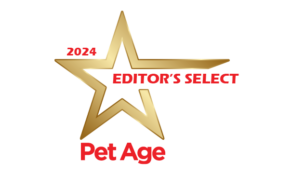Capitalizing!
Rebekah Harrison //August 6, 2014//
 From shampoos and bedding, to cleaning wipes and jackets, many consumers pick a product based on not just the price, but on the brand, or name, behind it, and usually become fiercely loyal to it.
From shampoos and bedding, to cleaning wipes and jackets, many consumers pick a product based on not just the price, but on the brand, or name, behind it, and usually become fiercely loyal to it.
That brand, or name, becomes iconic, and for retailers, selling these licensed products can translate into increased sales.
“Licensed products have more consumer awareness to support them,” said David Ezra, CEO of International Pet Group, whose brands include Sealy Dog Beds. “The customer believes in the brand. Take for example, a Sealy pet bed. It is similar to what you would find in a Sealy mattress and that is very well known to consumers.”
Like Owner, Like Pet
And, as pet owners continue to humanize their pets, the more valuable a licensed product becomes.
“We wanted to give them the ability to share their favorite brands with their pets,” said Steven Shweky, top dog at Fetch… for pets!, licensee of Burt’s Bees, DC Comics and Shout. “Pets are part of the family and for this reason customers prefer to share the brands that they know and trust with them. They’re looking for products for their pets with similar qualities to ones that they use for themselves.”
Licensed products are becoming increasingly popular for consumers. There are many benefits to obtaining licenses and carrying licensed products in a retail store. It also creates new opportunities for manufacturers to expand on an already popular product or brand.
“Licensing is a really unique way to grow your brand,” said Stephanie Volo, president of Planet Dog. “It’s a great opportunity to partner with like-minded companies.”
Worth the Cost
While manufacturers have to pay a license to use a name or brand likeness, such as a famous comic book character, many feel it is well worth it.
“We see a value in it, so we are willing to pay for it,” Ezra said. “We are willing to pay a royalty to obtain it. You pay a licensing fee but as a trade off, you get brand awareness. You can garner a higher price point in your store as well as critical mass.”
Coastal Pet Products Inc., licensee of Remington, Harley-Davidson, John Deere and others knows all the perks of licensing.
“Specialty items sell extremely well to a targeted market because of the reputation behind the brand,” said Jeff Wilfred, licensed account manager. “Each of our licenses has its own customer following that bring with it additional sales.”
Some companies have even gone as far as partnering with corporations targeted at specific demographics. Planet Dog has partnered with Life is Good to produce Life is good Pet products.
“We have taken our relationship with Life is Good to the next level,” said Volo of their new line. “They approached us and asked if we would be interested.”
Now, Planet Dog is responsible for licensing, developing, selling, marketing and distributing Life is good Pet products. This has opened a new door to Planet Dog’s primary demographic.
“Now, our primary cause is to sell into both the pet industry and the outdoor industry,” said Volo.
Life is Good is notoriously popular in the outdoor industry. Because of this, both Planet Dog and Life is good do not come in direct opposition.
“[Life is good] is very different than Planet Dog, but it’s the same quality,” said Volo. “The two lines are not in competition.”
Volo is hopeful that this partnership will help retailers.
“We are going to help retailers to grow and sell the line,” she said. “We are taking on what we have been so successful in and tweak it.”
Licensing has its own risks as well as benefits.
“It’s like starting a new company,” said Volo. “You really need the resources and excitement to take it on. As the CEO of Planet Dog, that’s my baby. So I had to take the time to understand the relationship between the brands, to make sure it’s beneficial to both of us.”
Obtaining a License
What is the process for obtaining a license?
“We usually reach out to companies,” said Brett Hirshburg, director of brand discovery at MultiPet. “Some are already exclusive to another company but those that aren’t we will negotiate with. We like to stick with the niche of nostalgic characters like Mr. Magoo or the Three Stooges.”
Multipet holds licenses for many dog toys, including the recent studio film, “Mr. Peabody and Sherman.”
Depending on the type of product, the first step to obtaining a license is usually pretty similar. Erin Breig, at Rubie’s Costume Company, uses the same approach when selecting licenses.
“We first identify what is going to be hot and what will make a great pet costume,” she said. “We are always doing the research to find out what will be the hottest new media across any and all platforms then we will contact the studio or agency that holds the rights to negotiate the deal.”
Other pet product companies can obtain licenses purely from experience.
“We obtained these licenses through demonstrating our ability to translate major national brands into pet products,” said Shweky. “By developing quality products consistently with licensed brands, we have been able to grow our brand portfolio.”
Once negotiations are finished, the real fun begins.
“After negotiation, both parties need to be good with the numbers,” said Hirshburg. “Then, they send Multipet artwork and the design factory works with it.” Samples are then made and sent back to the licensor.
“After approval of the product and packaging, we can start selling it,” he said.
Licensing isn’t a one way street. Many times, companies like, Multipet, take suggestions from the market they serve.
“We always gauge the interest of our customers,” said Hirshburg. “We use their feedback as a guide. We are very open to what they want to see.”
Benefits to Retailers
What are the benefits to having licensed products in your retail store?
According to Jackson Pornpitayalert, owner of Bob’s Tropical Fish in Los Angeles, it could increase sales vastly.
“SpongeBob Squarepants products always sell no matter what the quality is,” he said. “We have them on display. The kids notice them and parents buy them. I don’t know, I guess because it is under water. They are the fastest moving products that I have.”
April Meier, owner of Pawsitively Scrumptious in Crestview, Fla. knows all about moving licensed merchandise. Pawsitively Scrumptious carries licensed college football team merchandise.
“We carry bowls, shirts and all sorts of things for people to support their team,” said Meier. “People will come in and see a collar and then order a different team from us. They want everything they can get to support their team.”
Meier does even better around the new season.
“When August begins…The licensed merchandise does much better than the non-licensed products,” she said.



















